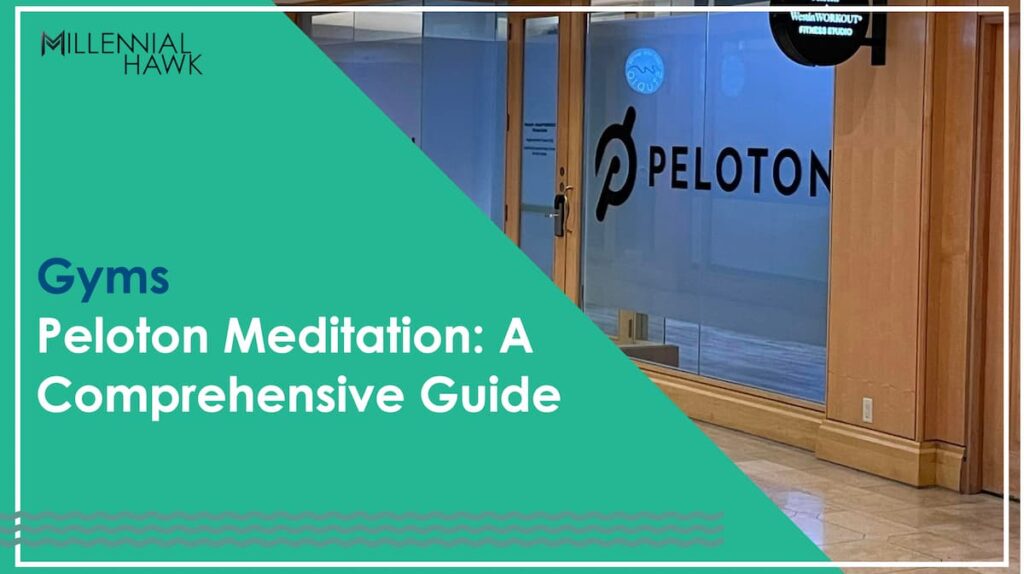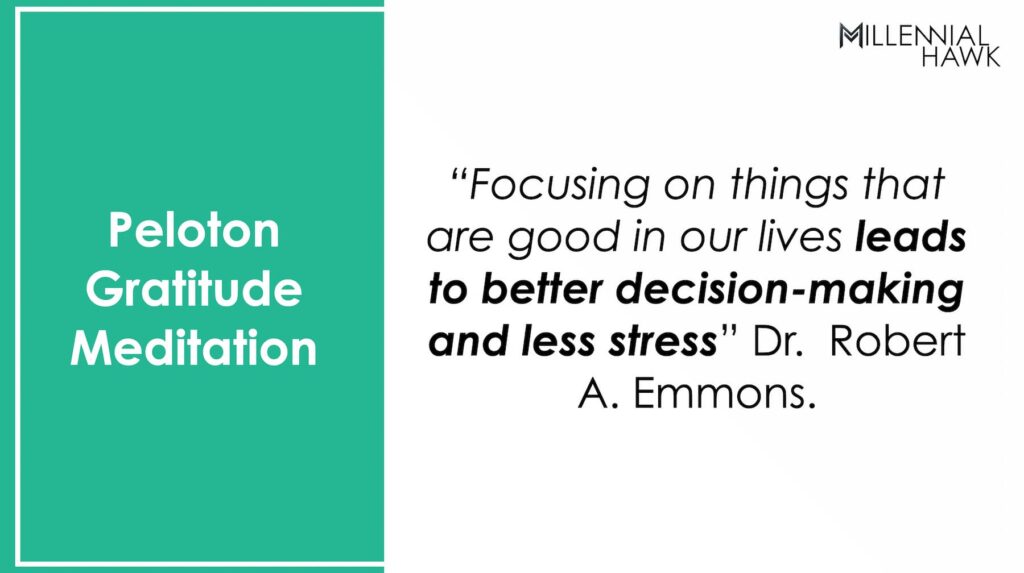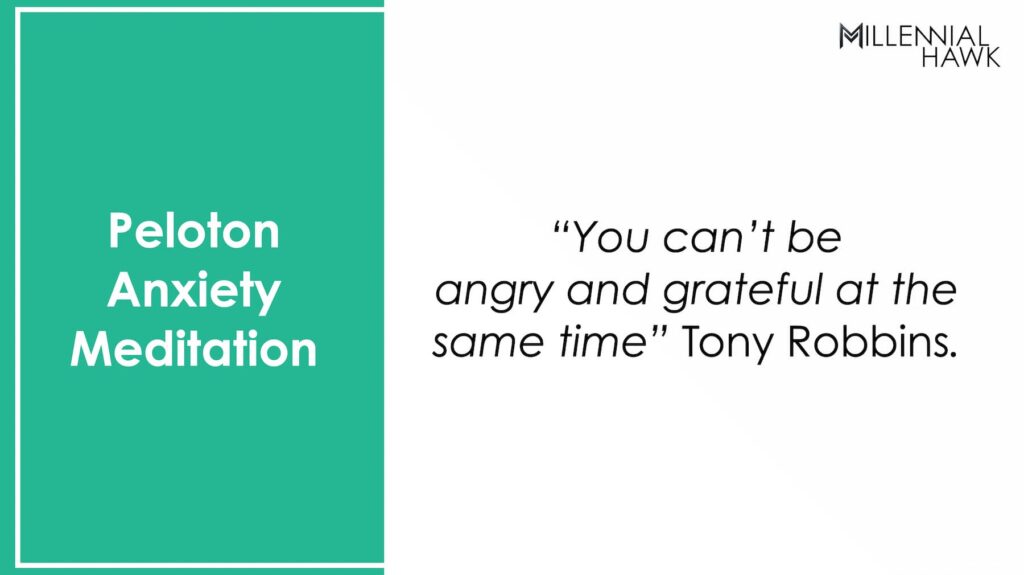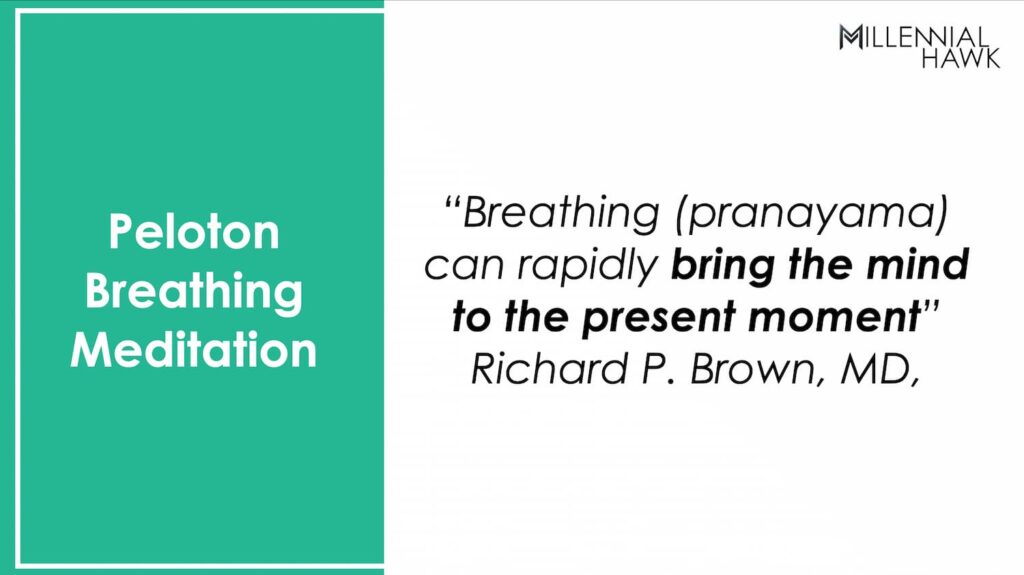
Peloton meditation refers to a series of videos and audio content focused on mental practices to improve psychological aspects such as self-regulation, sleep, anxiety, grief, awareness, and emotions. Unlike traditional fitness classes that raise your heart rate, Peloton meditation explores techniques to calm, relax, and center your mind.
A study by Do-Young Kim from Daejeon Oriental Hospital of Daejeon University published in the International Journal of Environmental Research and Public Health in January 2022 found that about 74% of people who meditated had better sleep, and about 68% felt less tired. This means that meditation can be a good way to feel healthier and happier.
Peloton provides over 2,000 meditation classes in English, German, and Spanish, offering a wide variety of techniques like mindfulness, healing, acceptance, guided meditation, body scan, gratitude, and more. Among these, Peloton sleep meditation led by instructors like Ross Rayburn, Anna Greenberg, Mariana Fernández, Nico Sarani, Kirra Michel, and others is the most popular.
While Peloton Meditation is becoming one of the most well-known classes on the Peloton App, it’s still considered quite basic compared to other meditation apps like Headspace or Calm. These apps have a larger variety of meditations, including guided and unguided sessions for beginners and less-structured programming for more advanced practitioners.
What is Peloton Meditation?
Peloton meditation is a series of on-demand and live sessions focused on mental wellness and relaxation, rather than calorie burning like other Peloton workouts. These sessions, more suited for beginners, are accessible through the Peloton App across all membership tiers, including free classes, Peloton App One, Peloton App+, and All Access.
Peloton meditations vary in length from 5 to 30 minutes and are available in both audio (podcast-style) and video formats. This flexibility allows users to engage in meditation at home, on the go, or before sleep, enhancing accessibility and convenience. In-person Peloton meditation classes are available in NYC, featuring instructors Ross Rayburn and Aditi Shah, but not in London studios.
How does the Peloton Meditation work?
Peloton meditation works by guiding you through simple, relaxing exercises, ideal even if you’ve never meditated before. It typically involves focusing on your breath or a specific thought, which helps calm the mind and reduce stress. As you follow the Peloton instructor’s guidance, you’ll learn to gently redirect your attention whenever it wanders, a common challenge for beginners. This process, as per Vedic science, positively modifies the inner faculty, reducing stress and improving overall health. A 2012 study by Serge Brand from the Psychiatric Hospital of the University of Basel, shows that 8-week meditation practice can lower cortisol levels and improve memory.
Meditation has gained popularity in many Western nations, and this chart illustrates the amount of research conducted on meditation and mindfulness in the last couple of years.

As someone new to Peloton meditation, the most difficult part for me was maintaining focus. My mind was wandering left and right, especially in more challenging Peloton midnight meditation classes that encourage deep self-reflection or prolonged silence. So, if you struggle at the beginning, it’s common to find your thoughts drifting, which can be a bit frustrating initially. What helps in Peloton meditation are the instructors. Their clear and calming instructions make it easier to grasp the concept of meditation, which is incredibly helpful for someone who’s just starting.
What are the Health Benefits of Peloton Meditation?
The health benefits of Peloton meditation are listed below.
- Enhanced Cognitive Function: A 2019 study by Julia C Basso published in the Behavioral Brain Research journal revealed that daily meditation sessions lasting 13 minutes for 8 weeks can significantly enhance attention, working memory, and recognition memory in non-experienced meditators.
- Improved Mental Health: In 2023, Aneeque Jamil and a team of researchers found that meditation positively impacts mental health. Meditation has been associated with addressing various mental problems such as social anxiety disorder, post-traumatic stress disorder (PTSD), anxiety, and depression.
- Stress Reduction: Meditation has been shown to reduce stress levels. A 2006 study by Albert J Arias from the University of Connecticut Medical School reported decreased cortisol levels, which is a stress hormone. Lower cortisol levels contribute to reduced stress and improved overall well-being.
- Physical Health Benefits: Meditation has a positive impact on physical health. It has been beneficial in various multi-factorial diseases like diabetes, hypertension, and fibromyalgia, according to a 2010 study by Sala Horowitz. Meditation has also helped lower blood cholesterol levels and increase high-density lipoproteins (HDL) levels.
- Longevity and Cellular Health: According to a 2013 study by Dean Ornish from the University of California San Francisco, meditation has been linked to the regulation of telomerase, an enzyme responsible for maintaining the length of telomeres, which are associated with aging. Regular meditation may contribute to healthy aging by delaying the shortening of telomeres.
- Positive Brain Changes: Magnetic resonance imaging (MRI) studies have shown that meditation leads to widespread changes in the brain, including improvements in various brain functions such as cognition and emotional regulation.
- Gene Expression: Meditation and Yoga practices have been found to positively affect gene expression, which can have wide-ranging effects on health, including disease prevention and management.
While Peloton meditation offers several benefits, one main drawback is that the classes don’t guide continuing or deepening your meditation practice outside of the Peloton app.
What are the Drawbacks of Peloton Meditation?
While Peloton meditation offers various benefits, it’s essential to acknowledge that there are also potential drawbacks associated with its practice. Here are the drawbacks of meditation based on the 2017 study by Ausiàs Cebolla from Universitat de València titled “Unwanted effects: Is there a negative side of meditation?”
- Unwanted Effects: According to the study, 25.4% of meditation practitioners reported experiencing unwanted effects. These effects were often mild and transitory, but they did occur.
- Anxiety Symptoms: Some of the reported drawbacks included anxiety symptoms, such as panic attacks during meditation.
- Depersonalization and Derealization: Another common side effect was depersonalization and derealization, where individuals felt disconnected from themselves and their surroundings.
- Hypomania or Depressive Symptoms: In some cases, meditation practitioners reported experiencing hypomania or depressive symptoms, such as over-energization and an inability to sleep.
- Physical Symptoms: Physical symptoms like muscle pain, headaches, nausea, and dizziness were also reported by some individuals.
The study found that UEs were more frequently reported during individual meditation practices, particularly during focused attention meditation, and when practicing for more than 20 minutes alone. Fortunately, most of the drawbacks were transitory and did not lead to discontinuing meditation practice or the need for medical assistance.
Who is Peloton Meditation suitable for?
Peloton meditation is suitable for everyone who wants to reduce stress and improve mental well-being, particularly those with busy lifestyles or high-stress jobs. It’s also ideal for individuals looking to enhance their emotional intelligence and overall personal growth. On the other hand, Peloton meditation may not be suitable for individuals with a history of severe psychiatric conditions, as they need to consult with mental health professionals before engaging in meditation practices.

What common mistakes do people make in Peloton Meditation?
Some common barriers and mistakes people make in their Peloton meditation practice include doubting the value or benefits of meditation, experiencing unpleasant physical and emotional states during meditation (such as restlessness, sleepiness, and doubt), having difficulty with mind-wandering, and feeling guilty for taking time for meditation. Less common mistakes people make when starting Peloton meditation include feeling weird or strange while meditating, having unmet expectations related to the practice, and viewing meditation sessions as failures when unable to achieve a specific goal like relaxation.
How to start Peloton Meditation?
To start Peloton Meditation, follow the steps below.
- Choose a Type: Select a type of Peloton meditation that suits your needs (e.g., mindfulness, relaxation).
- Choose Your Instructor: Pick the best Peloton meditation instructor that you like.
- Decide On Frequency: Decide how often you should do Peloton meditation and aim to meditate regularly, possibly daily.
- Choose a Time Frame: Start with shorter sessions and gradually increase the length.
- Commit to Streaks: Set a goal for daily Peloton meditation streaks.
- Create a Schedule: Choose the best time for meditation in your daily routine.
- Comfortable Position: Find a comfortable position that allows you to relax and focus.
What are the different Types of Peloton Meditation available?
Peloton offers seven different Meditation themes, including Breathe, Emotions, and Mindfulness, along with over 30 various techniques and individual classes, such as 5-minute Level Up Meditation, Grief Meditation, Fitness Goals Meditation, Empathy Meditation, and more. This table shows Peloton meditation types based on the theme.
| Theme | Peloton Meditation Type |
|---|---|
| Relax & Sleep | Peloton sleep meditation Peloton calming meditation Peloton relaxing meditation Peloton deep relations meditation |
| Breath | Peloton breathing meditation |
| Emotions | Peloton peace meditation Peloton energizing meditation Peloton courage meditation Peloton happiness meditation Peloton acceptance meditation Peloton kindness meditation Peloton gratitute meditation Peloton patience meditation Peloton empathy meditation |
| Mindfulness | Peloton mindfulness meditation Peloton morning meditation Peloton gratitute meditation Peloton body scan meditation Peloton witness meditation Peloton guided meditation Peloton confidence meditation |
| Fitness Focus | Peloton Level Up meditation Peloton rest day meditation Peloton peak performance meditation Peloton fitness goals meditation |
| Family & Pre/Postnatal | Peloton family meditation |
| Theme | Peloton holiday meditation Peloton Flow & Let Go meditation Peloton seasonal meditation Peloton mental health meditation Peloton walking meditation |
What is Peloton Sleep Meditation?
Peloton Sleep Meditation, also known as Peloton bedtime meditation, is a guided spoken meditation designed to aid in falling asleep and enhancing the quality of REM and Deep sleep. It features simple guided breathing exercises that help relax your body and calm your mind, naturally improving your sleep quality, easing stress, and helping with insomnia. The “Power of Sleep” Peloton program, spanning 2 weeks with 15 classes, also encourages meditating for 10-15 minutes each night to promote a truly restful sleep experience.

What is Peloton Walking Meditation?
Peloton walking meditation, known as kinhin in Buddhism, is a practice that combines mindfulness with movement in audio-only sessions lasting 10-20 minutes. Led by instructors like Kirra Michel and Ross Rayburn, it focuses on cultivating calmness while being aware of your surroundings during a walk. Unlike regular walking, Peloton walking meditation involves a slower pace, allowing you to be less distracted by thoughts. This practice is especially beneficial for those who sit for long periods and serves as an excellent complement to seated meditation.
What is Peloton Midnight Meditation?
Peloton Midnight Meditation is a guided session aimed at helping you fall back to sleep if you wake up in the middle of the night. It’s designed to encourage rest, relaxation, and restorative sleep by calming your thoughts and stilling your body, making it easier to return to sleep.
What is Peloton Anxiety Meditation?
Peloton Anxiety Meditation focuses on mind practices and physical changes to manage anxiety and stress. Techniques like muscle contraction in these meditations help reduce tension and trigger relaxation. One effective example is the Breathing Meditation, where instructors like Aditi Shah and Ross Rayburn guide you through calming exercises. This meditation involves slowing and deepening your breath, activating the parasympathetic response, reducing cortisol levels, and positively influencing emotions. Regular practice enhances stress and anxiety regulation, with research by Richard P. Brown, MD, affirming its benefits in reducing depression, anxiety, and PTSD.
How often should you do Peloton Meditation?
Aim for a daily Peloton meditation routine of at least 13 minutes over 8 weeks to enhance mood states, attention, and working memory. A study published in the Behavioral Brain Research Journal in 2019 by Julia C Basso, Alexandra McHale, Victoria Ende, Douglas J Oberlin, and Wendy A Suzuki found that daily meditation sessions lasting 13 minutes for 8 weeks led to significant improvements.
What are the best Peloton Meditations?
The best Peloton meditation classes are listed below.

- Peloton Body Scan Meditation: Peloton’s body scan meditation, led by Ross Rayburn, is a simple yet effective way to increase self-awareness and relax. In just 5 minutes, it guides you through noticing sensations and tension in each part of your body, from head to toe. This process helps you tune into your physical state and makes you more aware of your thoughts and emotions. Plus, a 2022 study by Ruochen Gan from Zhejiang University shows that such meditation positively impacts mindfulness, contributing to your overall well-being.
- Peloton Gratitude Meditation: Peloton gratitude meditation, a 5 to 10-minute practice focusing on things you’re grateful for, is a great morning routine. It changes your emotional state, boosts self-esteem, and increases productivity, making you happier and more focused. Studies by Dr. Robert A. Emmons show it leads to better decision-making, reduced stress, and improved brain functions, reinforcing that positive thoughts can change our brains’ structure.
- Peloton Visualization Meditation: Peloton visualization meditation, like the “Power of Sleep” class, involves imagining your thoughts and worries being placed into a box. This practice, which is great after morning yoga, clears negative thoughts and sharpens focus on daily goals, boosting self-confidence and readiness for challenges. A 2017 study by Peter R Giacobbi Jr from West Virginia University shows that visualization, or guided imagery, not only aids in mindfulness but also in healing and treating specific conditions, making it a powerful tool for mental and physical well-being.
- Peloton Breathing Meditation: Peloton breathing meditation, 5-minute sessions focus on deepening and slowing down breathing, which stimulates the autonomic nervous system and promotes relaxation. Regular practice, especially during moments of anxiety, helps reduce stress hormones and improves emotional regulation. Dr. Richard P. Brown from Columbia University highlights its effectiveness in reducing stress and treating conditions like depression and anxiety.
- Peloton Deep Relaxation Meditation: Peloton deep relaxation meditation helps release stress and muscle tension throughout the body, ideal for lying down to strengthen mind-muscle connections. This technique involves tensing and then relaxing different muscle groups, which eases anxiety by reducing muscle tension and activating the body’s relaxation response. It’s similar to progressive muscle relaxation, where you tense muscles while inhaling and relax them while exhaling, guided by the instructor.
What are the Best Peloton meditation Instructors?
The top Peloton meditation instructors are Ross Rayburn, Chelsea Jackson Roberts, and Aditi Shah. Their soothing voices create a relaxing atmosphere, which is crucial for meditation since many prefer to close their eyes or lie down during sessions. What matters most in meditation classes is the tone, friendliness, and tempo of the instructors, rather than their appearance, and it’s evident that these instructors have a genuine passion and background in meditation.
Is Peloton Meditation Effective?
Yes, Peloton meditation is effective as it uses body physiology to alter emotional states within 5 to 10 minutes, through guided techniques involving breathing, muscle tension, and thought control. Far from being a cult or fad, it’s a collection of simple exercises aimed at enhancing self-awareness, relaxing the body, and improving focus.
How long does a Peloton meditation last?
A Peloton meditation typically lasts between 5 to 15 minutes, making it easy to incorporate into your daily routine.
Does meditation count towards Peloton streak?
Yes, meditation classes count towards maintaining your Peloton streak.
How to find Peloton Meditation Class on the Peloton App?
“You can find Meditation among the Peloton classes on the Peloton App by following these steps:”
- Open the App: Start by launching the Peloton App on your device.
- Navigate to Classes: On the main screen, look for the ‘Classes’ tab or section.
- Select Category: Within ‘Classes’, find and select the ‘Meditation’ category.
- Browse Options: Scroll through the meditation options to find a session that suits your needs.
- Choose a Class: Once you find a class you like, click on it to start your meditation session.
How to Find Peloton meditation on your next Delta Airlines flight?
To find Peloton meditation on your next Delta Airlines flight, look for the Peloton stretching and meditation classes in the in-flight entertainment system, thanks to Peloton’s partnership with Delta. You’ll find a variety of classes, including meditation for anxiety, sleep, and morning rituals, available on all Delta aircraft except the B-717, which lacks monitors. This collaboration marks the first instance of Peloton content being featured outside its app, offering relaxation and calm during your flight.

What are some alternatives similar to Peloton Meditation?
Some alternatives similar to Peloton Meditation include the following.
- Calm: A relaxation app offering guided meditations, sleep stories, and mindfulness exercises.
- Headspace: Features a wide range of meditation sessions for stress, sleep, and focus.
- Better Sleep: Specializes in sleep-improving meditations and soundscapes.
- Balance App: Personalized meditation experiences tailored to individual needs.
- Headway: Combines self-growth with short, actionable insights from non-fiction books.
- Talkspace: Offers therapy sessions along with mental wellness tools and resources.
What is the difference between Peloton meditation and the Calm app?
Peloton meditation focuses on individual classes, making it great for beginners looking to try meditation. In contrast, the Calm app offers a more comprehensive experience with various themes, multi-week programs, and a specialized approach, including ambient sounds, guided sessions with a slowing pace, and even sleep stories.
What is the difference between Peloton meditation and the Headspace app?
Headspace offers a wider range of meditation themes, courses, and even unguided sessions. Headspace includes helpful content on mindfulness basics, making it great for those seeking in-depth meditation resources. While Peloton is primarily a fitness app with a growing meditation program, Headspace and Calm are dedicated meditation apps with more comprehensive meditation offerings.
